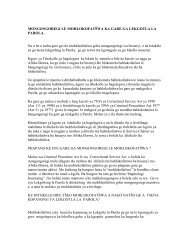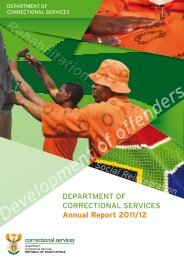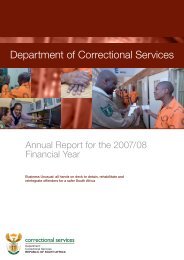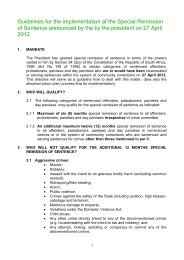Management of Remand Detainees in South Africa - DCS-Home
Management of Remand Detainees in South Africa - DCS-Home
Management of Remand Detainees in South Africa - DCS-Home
Create successful ePaper yourself
Turn your PDF publications into a flip-book with our unique Google optimized e-Paper software.
Article 10<br />
1. All persons deprived <strong>of</strong> their liberty shall be treated with humanity and with respect<br />
for the <strong>in</strong>herent dignity <strong>of</strong> the human person.<br />
2. (a) Accused persons shall, except <strong>in</strong> exceptional circumstances, be segregated<br />
from convicted persons and shall be subject to separate treatment appropriate<br />
to their status as unconvicted persons;<br />
(b) Accused juvenile persons shall be separated from adults and brought as<br />
speedily as possible for adjudication.<br />
3. The penitentiary system shall comprise treatment <strong>of</strong> prisoners the essential aim <strong>of</strong><br />
which shall be their reformation and social rehabilitation. Juvenile <strong>of</strong>fenders shall be<br />
segregated from adults and be accorded treatment appropriate to their age and legal<br />
status.<br />
Article 11<br />
No one shall be imprisoned merely on the ground <strong>of</strong> <strong>in</strong>ability to fulfil a contractual<br />
obligation.<br />
F<strong>in</strong>ally, Article 14(c) <strong>of</strong> the ICCPR underscores the right <strong>of</strong> an accused person “to be tried<br />
without undue delay”. The essence <strong>of</strong> this <strong>in</strong>junction was stated <strong>in</strong> Fillastre v. Bolivia,<br />
Communication No. 336/1988 where the United Nations Human Rights Committee found that:<br />
“What constitutes „reasonable time‟ is a matter <strong>of</strong> assessment for each particular<br />
case. The lack <strong>of</strong> adequate budgetary appropriations for the adm<strong>in</strong>istration <strong>of</strong><br />
crim<strong>in</strong>al justice… does not justify unreasonable delays <strong>in</strong> the adjudication <strong>of</strong><br />
crim<strong>in</strong>al cases. nor does the fact that <strong>in</strong>vestigations <strong>in</strong>to a crim<strong>in</strong>al case are <strong>in</strong><br />
their essence, carried out by way <strong>of</strong> written proceed<strong>in</strong>gs, justify such delays.”<br />
The ICCPR is a treaty which <strong>South</strong> <strong>Africa</strong> acceded to on 3 October 1994. Apart from the fact<br />
that <strong>South</strong> <strong>Africa</strong> has an obligation under the ICCPR as a State party to the treaty, there is a<br />
constitutional acceptance <strong>of</strong> <strong>in</strong>ternational law as a very valuable norm <strong>in</strong> the <strong>South</strong> <strong>Africa</strong>n legal<br />
system. Section 39(1) (b) <strong>of</strong> the Constitution <strong>of</strong> the Republic <strong>of</strong> <strong>South</strong> <strong>Africa</strong> provides that “when<br />
<strong>in</strong>terpret<strong>in</strong>g the Bill <strong>of</strong> Rights, a court, tribunal, or forum must consider <strong>in</strong>ternational law.” Also <strong>in</strong><br />
this regard, Section 232 <strong>of</strong> the constitution stipulates that “customary <strong>in</strong>ternational law is law <strong>in</strong><br />
the Republic unless it is <strong>in</strong>consistent with the Constitution or an Act <strong>of</strong> Parliament.” In the same<br />
ve<strong>in</strong>, Section 233 <strong>of</strong> the Constitution encourages the use <strong>of</strong> good <strong>in</strong>terpretation <strong>of</strong> <strong>in</strong>ternational<br />
law <strong>in</strong> domestic adjudication. It states “when <strong>in</strong>terpret<strong>in</strong>g any legislation, every court must prefer<br />
any reasonable <strong>in</strong>terpretation <strong>of</strong> the legislation that is consistent with <strong>in</strong>ternational law over any<br />
alternative <strong>in</strong>terpretation that is <strong>in</strong>consistent with <strong>in</strong>ternational law.”<br />
50













